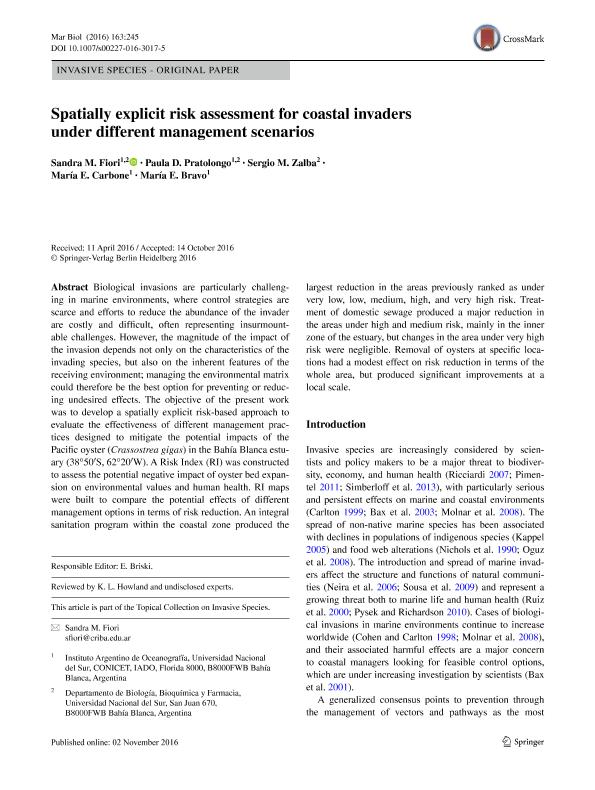Mostrar el registro sencillo del ítem
dc.contributor.author
Fiori, Sandra Marcela

dc.contributor.author
Pratolongo, Paula Daniela

dc.contributor.author
Zalba, Sergio Martín

dc.contributor.author
Carbone, Maria Elizabeth

dc.contributor.author
Bravo, María Emilia

dc.date.available
2017-10-12T20:10:15Z
dc.date.issued
2016-10
dc.identifier.citation
Fiori, Sandra Marcela; Pratolongo, Paula Daniela; Zalba, Sergio Martín; Carbone, Maria Elizabeth; Bravo, María Emilia; Spatially explicit risk assessment for coastal invaders under different management scenarios; Springer; Marine Biology; 163; 10-2016; 245-258
dc.identifier.issn
0025-3162
dc.identifier.uri
http://hdl.handle.net/11336/26510
dc.description.abstract
Biological invasions are particularly challenging in marine environments, where control strategies arescarce and efforts to reduce the abundance of the invader are costly and difficult, often representing insurmountable challenges. However, the magnitude of the impact of the invasion depends not only on the characteristics of the invading species, but also on the inherent features of the receiving environment; managing the environmental matrix could therefore be the best option for preventing or reducing undesired effects. The objective of the present work was to develop a spatially explicit risk-based approach to evaluate the effectiveness of different management practices designed to mitigate the potential impacts of the Pacific oyster (Crassostrea gigas) in the Bahía Blanca estuary (38°50′S, 62°20′W). A Risk Index (RI) was constructed to assess the potential negative impact of oyster bed expansion on environmental values and human health. RI maps were built to compare the potential effects of different management options in terms of risk reduction. An integral sanitation program within the coastal zone produced the largest reduction in the areas previously ranked as under very low, low, medium, high, and very high risk. Treatment of domestic sewage produced a major reduction in the areas under high and medium risk, mainly in the inner zone of the estuary, but changes in the area under very high risk were negligible. Removal of oysters at specific locations had a modest effect on risk reduction in terms of the whole area, but produced significant improvements at alocal scale.
dc.format
application/pdf
dc.language.iso
eng
dc.publisher
Springer

dc.rights
info:eu-repo/semantics/openAccess
dc.rights.uri
https://creativecommons.org/licenses/by-nc-sa/2.5/ar/
dc.subject
Especies Invasoras
dc.subject
Crassostrea Gigas
dc.subject
Mapa de Riesgo
dc.subject
Manejo
dc.subject.classification
Bioquímica y Biología Molecular

dc.subject.classification
Ciencias Biológicas

dc.subject.classification
CIENCIAS NATURALES Y EXACTAS

dc.title
Spatially explicit risk assessment for coastal invaders under different management scenarios
dc.type
info:eu-repo/semantics/article
dc.type
info:ar-repo/semantics/artículo
dc.type
info:eu-repo/semantics/publishedVersion
dc.date.updated
2017-09-19T14:41:40Z
dc.journal.volume
163
dc.journal.pagination
245-258
dc.journal.pais
Alemania

dc.journal.ciudad
Berlin
dc.description.fil
Fil: Fiori, Sandra Marcela. Consejo Nacional de Investigaciones Científicas y Técnicas. Centro Científico Tecnológico Conicet - Bahía Blanca. Instituto Argentino de Oceanografía. Universidad Nacional del Sur. Instituto Argentino de Oceanografía; Argentina. Universidad Nacional del Sur. Departamento de Biología, Bioquímica y Farmacia; Argentina
dc.description.fil
Fil: Pratolongo, Paula Daniela. Consejo Nacional de Investigaciones Científicas y Técnicas. Centro Científico Tecnológico Conicet - Bahía Blanca. Instituto Argentino de Oceanografía. Universidad Nacional del Sur. Instituto Argentino de Oceanografía; Argentina. Universidad Nacional del Sur. Departamento de Biología, Bioquímica y Farmacia; Argentina
dc.description.fil
Fil: Zalba, Sergio Martín. Universidad Nacional del Sur. Departamento de Biología, Bioquímica y Farmacia; Argentina
dc.description.fil
Fil: Carbone, Maria Elizabeth. Consejo Nacional de Investigaciones Científicas y Técnicas. Centro Científico Tecnológico Conicet - Bahía Blanca. Instituto Argentino de Oceanografía. Universidad Nacional del Sur. Instituto Argentino de Oceanografía; Argentina
dc.description.fil
Fil: Bravo, María Emilia. Consejo Nacional de Investigaciones Científicas y Técnicas. Centro Científico Tecnológico Conicet - Bahía Blanca. Instituto Argentino de Oceanografía. Universidad Nacional del Sur. Instituto Argentino de Oceanografía; Argentina
dc.journal.title
Marine Biology

dc.relation.alternativeid
info:eu-repo/semantics/altIdentifier/url/https://link.springer.com/article/10.1007%2Fs00227-016-3017-5
dc.relation.alternativeid
info:eu-repo/semantics/altIdentifier/doi/http://dx.doi.org/10.1007/s00227-016-3017-5
Archivos asociados
